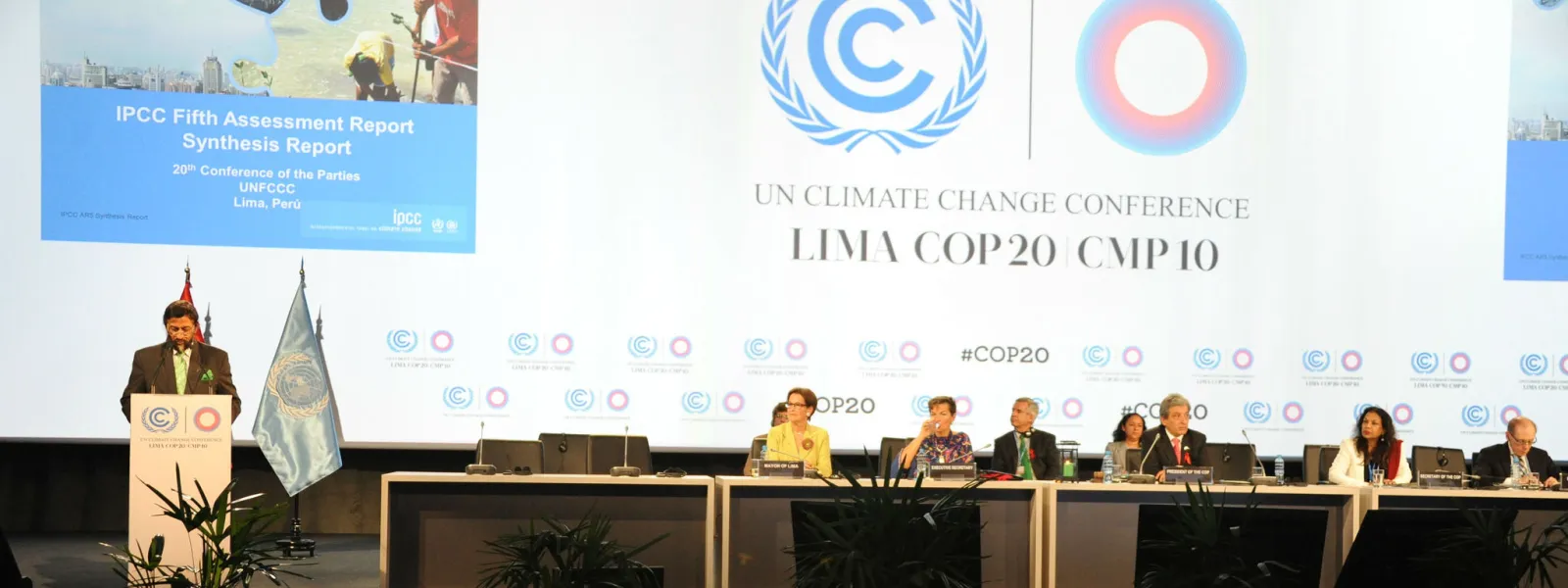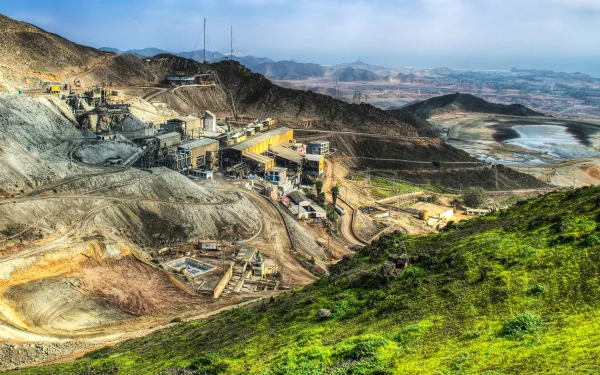
Project
Photo: UNFCCCMonitoring the UN Climate Negotiations
As changes in climate become more extreme, their affects are being hardest felt throughout developing countries. Since 1994, the United Nations Framework Convention on Climate Change has laid out actions to limit the increase of global average temperatures and confront the impacts of climate change.
The States that are Parties to the Convention meet every year in the so-called Conference of the Parties (COP) to review their commitments, the progress made in fulfilling them, and pending challenges in the global fight against the climate crisis.
At COP21 in 2015, they adopted the Paris Agreement, which seeks to strengthen the global response to the climate emergency, establishing a common framework for all countries to work on the basis of their capacities and through the presentation of Nationally Determined Contributions (NDC) that will:
- Limit the increase in global temperatures to 2°C compared to pre-industrial levels and continue efforts to limit it to 1.5°C;
- Increase the capacity of countries to adapt to the impacts of climate change; and
- Ensure that financing responds to the goal of reducing greenhouse gas emissions.
Our focus areas
THE CLIMATE CRISIS AND HUMAN RIGHTS
The climate crisis, due to its transversal character, has repercussions in various fields, geographies, contexts and people. In this regard, the Preamble to the Paris Agreement states that it is the obligation of States to "respect, promote and fulfill their respective obligations on human rights, the right to health, the rights of indigenous peoples, local communities, migrants, children, persons with disabilities and people in vulnerable situations and the right to development, as well as gender equality, the empowerment of women and intergenerational equity."
AIDA at the COP
COP25: Chile-Madrid 2019
At COP25 in Madrid, Spain, we advocated for the inclusion of the human rights perspective in various agenda items. We promoted the incorporation of broad socio-environmental safeguards in the regulation of Article 6 of the Paris Agreement, which refers to carbon markets. We closely followed the adoption of the Gender Action Plan, as well as the Santiago Network, created "to catalyze technical assistance […] in developing countries that are particularly vulnerable to the adverse affects of climate change." We also encouraged the inclusion of ambitious and measurable targets for the reduction of short-lived climate pollutants in the climate commitments of States.
Related projects
UN Representative on Indigenous Peoples asked to investigate human rights violations caused by Panama’s Barro Blanco dam
Washington, DC, United States. A total of 12 civil society organizations urged the United Nations (UN) Special Rapporteur on the Rights of Indigenous Peoples, James Anaya, to conduct a formal investigation into the human rights impacts of the Barro Blanco dam located on the Tabasará River in Panama. The Panamanian and international organizations also asked Mr. Anaya to call on the government of Panama to immediately halt the dam’s construction until the threats to the rights of the indigenous Ngӓbe people affected by the project have been fully addressed. The Barro Blanco controversy received special attention at the UN climate talks held last week in Bonn, Germany, because the project is registered under the Clean Development Mechanism (CDM), a carbon offsetting scheme established under the Kyoto Protocol. “The Barro Blanco dam will directly affect Ngӓbe people, yet we were not even consulted about the project before it was approved,” said Weni Bagama, an indigenous Ngӓbe leader of the Movimiento 10 de Abril, a community-based movement defending the Tabasará River from development projects. In September 2012, the UN Development Programme (UNDP) conducted a fact-finding mission at the project site and interviewed Ngäbe community members about projected impacts. UNDP’s assessment report confirmed that the dam will flood homes and religious, historical and cultural sites in the Ngӓbe-Buglé territory. The report further documented the project’s impacts, including that the dam will convert the flowing Tabasará River into a stagnant lake ecosystem, affecting the Ngäbe’s diet and means of subsistence. “Despite proof that the dam will have grave impacts on the Ngӓbe way of life and cultural heritage, the construction of the dam continues,” added Ms. Bagama. “We urge Mr. Anaya to investigate the situation and do all he can to protect the rights of the indigenous peoples affected by this project.” “The public forum where the project was discussed was held as a community meeting without a clear notification of its true objective, and there was no representation from the affected indigenous communities,” said Tania Arosemena, Legal Director of the Environmental Advocacy Center, Panama (CIAM by its Spanish initials). “The consultation process did not comply with the minimum standards demanded by national and international law on this matter.” CIAM filed a lawsuit in 2011 on behalf of members of the Ngäbe communities, who challenge the approval of the project’s environmental impact assessment. That suit is pending. Several of the organizations that wrote to Mr. Anaya also raised the Barro Blanco case at the UN climate talks in Bonn last week. “The Barro Blanco project illustrates an urgent need for reform within the CDM,” said Alyssa Johl, senior attorney at the Center for International Environmental Law (CIEL). “Once a project has been registered under the CDM, affected communities have no means to voice their concerns regarding the project’s social and environmental impacts. The UN climate regime must establish a process that allows communities to seek recourse for the harms associated with CDM projects, as well as a process to deregister projects where there are clear violations of CDM rules as in the case of Barro Blanco.” “Given the CDM’s lack of a complaint procedure and the Panamanian government’s failure to protect the Ngäbe’s rights, the communities need Mr. Anaya’s support,” said Abby Rubinson, associate attorney in Earthjustice’s International Program. “We appreciate Mr. Anaya’s past efforts to engage the Panamanian government to respond to the Ngäbe’s concerns, and we ask him to continue to play this much-needed role to prevent further violations.” The Panamanian non-governmental organizations (NGOs) that signed the letter to Mr. Anaya were CIAM, Movimiento 10 de Abril, and Asociación Ambientalista de Chiriquí. CIEL, Earthjustice, Inter-American Association for Environmental Defense (AIDA), International Rivers, Carbon Market Watch, Both ENDS, Collective Voices for Peace, Salva la Selva and Marin Interfaith Task Force on the Americas comprised the international groups that signed the letter to Mr. Anaya.
Read more
Collective Statement to the Colombian government on the collapse of Law 1382
The organizations and persons behind the Statement express our concerns to the Colombian government about the implications of the collapse of the Mining Code in effect since May 11, 2012 (Law 1382, 2010) and the consequent return to the previous Mining Code (Law 685 2001), particularly as concerns the serious consequences to the country’s environment (detailed in the document). To prevent these impacts, we urge you to take the following steps: Present in the shortest time possible a draft of the Mining Code that overcomes the deficiencies of mining regulations and brings the legislation into line with the duties of biodiversity and water protection, while previously guaranteeing that ethnic groups have the right to free, prior and informed consultation. Maintain the moratorium on mining permits until a new Mining Code is submitted and approved. Immediately decree a moratorium on environmental licenses in order to avoid the elimination of environmental protection clauses. Statement available in Spanish only.
Read moreReport on the situation in La Oroya (Peru): When investor protection threatens human rights
The International Federation for Human Rights (FIDH) presented a balance of the controversial case of industrial pollution. Huancayo, Peru – The International Federation for Human Rights (FIDH) released a report on the situation in La Oroya, a city in the central Andean region of Peru that is at the center of a controversial case of industrial pollution caused by a poly-metallic smelter in operation since 1922. For decades, the people of La Oroya have been exposed to high levels of air pollution stemming from the complex’s emissions of toxic substances including lead, cadmium, arsenic and sulfur dioxide. In the middle of the 2000s La Oroya was identified as one of the 10 most polluted cities in the world. According to independent studies, 97% of children between the ages of 6 months and 6 years, and 98% of those between 7 and 12 years old still have high levels of lead in their blood. The percentage reaches 100% in La Oroya Antigua, the area closest to the smelter. The effects of lead poisoning are irreversible. Doe Run Peru, a subsidiary of the U.S.-based Doe Run Company, began operating the complex after its privatization in 1997. Both the company and the Peruvian State have failed to comply with their obligations to prevent environmental impact and respect the human rights of the population of La Oroya. In response, the Interamerican Association for Environmental Defense (AIDA) and other organizations requested the Inter-American Commission on Human Rights (IACHR) in 2005 to issue precautionary measures for people whose health was at serious risk from the pollution in the city. On August 31, 2007 the IACHR ordered the State to adopt measures to protect the health, integrity and life of a group of residents of La Oroya. The precautionary measures require Peru to provide a specialized medical diagnostic to the beneficiaries plus specialized and adequate medical treatment to those who, based on the diagnosis, are in danger of irreparable damage to their physical integrity or lives. Also since 2007, a complaint against Peru has been pending before the IACHR for the violation of human rights due to the toxic emissions from the La Oroya Metallurgical Complex. AIDA, APRODEH, Earthjustice and the Center for Human Rights and Environment (CEDHA) are representing the victims and the beneficiaries of the precautionary measures in the case. “AIDA has been working and monitoring the situation in La Oroya for over a decade. Over this time we have seen the extent of the damage to victims’ health in La Oroya due to the pollution that they have been and continue to be exposed to. The State must assume its obligations and fully comply with the IACHR´s precautionary measures that are in effect”, said Maria Jose Veramendi, an AIDA legal advisor. Meanwhile, parents of children with high levels of lead in their blood have tried to obtain compensation for the damages through a collective action in the United States (Missouri), headquarters of the complex’s parent company The Renco Group. In late 2010, Renco initiated international arbitration alleging its rights as a foreign investor as guaranteed by the Free Trade Agreement between Peru and the United States were violated. Renco asked for compensation of $800 million. “The company not only denied the impacts on the citizens and tried to evade responsibility, but in the face of the protests it pursued a campaign of stigmatization and attacks against those who were trying to defend their rights”, said Souhayr Belhassen, president of the FIDH. This case illustrates the conflict between international human rights law and investor protection. It also exposes the legal strategy of the companies allegedly involved in human rights violations that seek to evade responsibility and deny victims their right to reparation. The FIDH report, entitled Metallurgical Complex of La Oroya: When investor protection threatens human rights, includes a series of recommendations directed at the Peruvian authorities and the company involved. AIDA and APRODEH, as organizations representing the victims of La Oroya before the Inter-American Human Rights System, thank the FIDH and believe that the report is an important contribution to visualize the increasingly serious human rights violations suffered by the residents of La Oroya, who still expect the State to recognize its responsibility and bring justice to their claims. At the same time, the Archdiocese of Huancayo, whose role in defending the right to a healthy environment in La Oroya has been crucial, says the report is a major contribution to its work. See de PDF version of the report.
Read more